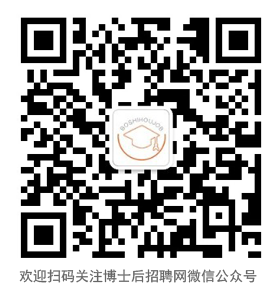2019年2月深圳大学高等研究院纳米电化学实验室招聘博士后
时间:2019-02-15 来源:未知
深圳大学高等研究院纳米电化学实验室现面向国内外诚聘博士后1-2人,具体情况如下:
一、院所介绍
深圳大学高等研究院是深圳大学新成立的一个包含本科与研究生培养、侧重交叉学科教学和研究的校内新型教育机构。高等研究院是深圳大学内部一个探索全面改革创新、实行特殊管理体制的、开展交叉学科创新人才培养和科学研究的学术特区。高等研究院主页:http://ias.szu.edu.cn/
二、PI介绍
李秀婷研究员博士毕业于英国牛津大学,主要从事单纳米颗粒电化学以及能源相关电催化反应研究,师从著名电化学家Richard G. Compton 教授。近年来在Angew. Chem. Int. ed.、ACS Catal.、J. Phys.Chem. Lett.和Chem. Sci.等国际权威学术期刊发表论文20多篇。目前的研究兴趣是发展单体电化学原位检测技术,用于研究能源转换与储存中相关电化学反应的机理和动力学信息;将单体电化学检测技术运用在环境检测、生物医药等实际领域;研制高性能低噪音的电化学设备及其组件等。更多详情见李秀婷研究员个人主页:https://ias.szu.edu.cn/info/1042/3389.htm
三、应聘条件
1. 已取得博士学位,并在相关领域发表过SCI研究论文,具有较强的英语阅读和写作能力。
2. 工作认真严谨,具独立从事课题研究的能力,具较强责任心和团队合作精神。
3.电化学、分析化学、电子学、纳米材料合成与表征等专业背景者,具有扎实电化学研究经验者优先。
4. 取得博士学位不超过三年,年龄在35岁以下。
四、聘期待遇
深圳大学(普通)博士后综合年薪约32万元。
(一)深圳市待遇
1、每人每年18万元的生活补助,总额不超过36万元。
2、对出站博士后给予30万元资助,用于科研投入或创业前期费用。
3、符合深圳市人才计划的可以申请相应的住房补贴:符合深圳市孔雀人才条件的,可以申请最低160万元的人才补贴; 符合深圳市后备级人才条件的,可以申请160万元的住房补贴。
4、若深圳市博士后人才资助政策有所调整,以最新的文件规定为准。
(二)深圳大学待遇
1、深圳大学提供约14万的综合年薪。
2、深圳大学优秀博士后人才培养计划:入站阶段,对优秀的博士后实施入站奖励(见7);出站阶段,对在站期间取得优秀科研成果的博士后予以科研奖励。
3、符合条件的博士后可申请评定专业技术资格。
4、符合学校政策要求的优秀博士后可申请转为教师。
5、博士后在站期间可以负责人身份申请各级科研课题资助。
6、博士后人员进站,可自愿选择落户深圳市。选择落户深圳市的,其配偶及未成年子女可办理随迁入户。博士后子女入托、入学等按深圳市相关条例执行。
7、符合以下条件者,可申请博士后入站奖励计划:
(a)基本条件:进站时为33周岁以下,获得博士学位在1年以内(以博士后到校报到时间为限)。
(b)入选资格,以下二项符合其中一项:
A.泰晤士高等教育世界大学前200名高校(包括国内)应届或一年内毕业的博士。
B.自然科学类博士在博士期间以第一作者发表3篇JCR二区以上学术论文。
(c)奖励金额:对于符合上述要求的博士后,给予额外的奖励性待遇每月2000元,共发放两年。
五、岗位职责
1.完成合作导师布置的科研任务;
2.独立开展课题研究,通读英文文献和撰写英文论文;
3.博士后在站工作期限一般为两年,根据项目情况和在站期间表现可续签;
4.博士后在站期间应以第一作者发表核心期刊论文4篇,或2篇JCR2区文章,或1篇JCR1区文章(期刊的确认标准参照深圳大学相关规定)。
六、应聘方式
应聘者将个人简历及代表性成果电子文档发至xiuting.li@szu.edu.cn(邮件主题标明为“姓名+应聘岗位+教育科研人才网”), 初审合格者将被通知面试。
七、联系方式
联系地址:深圳市南山区南海大道3688号深圳大学办公楼356室
联系人:李秀婷
联系电话:0755-26714383
八、申请截止时间
长期有效
What Your Job Will Be Like
We are seeking a Postdoctoral Appointee, to work on electrochemistry of single nanoparticles (NPs) via a state-of-the-art electrochemical method called ‘nano-impact’. The phenomenon of the latter, due to the Brownian collisions of NPs with an electrode held at a suitable potential, enables the NPs to be individually electro-reduced or oxidised, or to mediate (catalyse) a charge transfer process. Electrochemistry at nanoscale could give new insights into the mechanisms and dynamics of electrochemical processes of interest, realising an entirely fresh way of studying nanoparticles, their reactivity and catalytic properties.
The research interests of the Nano-EC Lab of IAS are (a) to explore the novel application of the nano-impact method to diverse nanoparticles especially those used for energy transformation and storage; (b) to turn the understanding in the fundamental study of diverse nano-objects into real world analytical practice; (c) to develop highly sensitive instrumentation and components for the nano-impact measurements.
On any given day, you may be called on to:
Contribute to a multidisciplinary research effort
Responsible for daily experimental research
Publish in innovative research high-level peer-reviewed leading journals
Present cutting-edge research at conferences
Qualifications We Require
Ph.D. within the last three years in electrochemistry, materials science, chemistry, electronics or a closely related field, and no more than 35 years old.
Extensive laboratory experience in nanomaterials synthesis and characterisation, electrochemical investigations or EC workstation related electronics.
Outstanding record of independent research, publications and conference presentations.
Familiarity with and a willingness to explore connections between materials science and electrochemistry.
Technical skills related to programming, data processing, and instrument.
Ability to engage and to contribute to multiple programs.
Desire to conduct independent, focused research.
Candidates should be highly motivated, team-oriented individuals.
Position Information
This postdoctoral position is up to two years, which may be renewed if warranted by ongoing operational needs, continuing availability of funds, and satisfactory job performance.
Salaries/Benefits
320,000 yuan per year
About the PI
The PI, Dr Xiuting Li, completed her PhD in Physical and Theoretical Chemistry at University of Oxford, UK under supervision of the world-known electrochemist Professor Richard G. Compton. Dr Li has broad interests in both fundamental and applied electrochemistry, especially electro-catalysis and electro-analysis including nano-chemical aspects. She has pioneering research experience in catalytic nano-impacts and has published more than 20 papers in high-impact journals such as Angew. Chem. Int. ed., ACS Catal., J. Phys. Chem. Lett. and Chem. Sci. etc.. Her expertise is using the particle-electrode collision methodology to uncover the underlying theories for the purpose of practical applications.
About IAS, Shenzhen University
The Institute for Advanced Study (IAS) of Shenzhen University is a newly established institution, consisting of both undergraduate and postgraduate programs, and focusing on interdisciplinary teaching and research. The institute is a special academic zone inside the university but its operation and management conform to the rules and procedures implemented in most institutions across the globe, independent of the current system in Shenzhen University.
Contact Information
Dr. Xiuting Li
Tel: +86-755-26714383
Email: xiuting.li@szu.edu.cn
Address: Rm. 356, Administration Building, Shenzhen University, Nanshan District, Shenzhen, Guangdong, China 518060
原文出处:
https://hr.szu.edu.cn/info/1024/2723.htm
声明:凡本网注明"来源:XXX"的文/图等稿件,本网转载出于传递更多信息及方便产业探讨之目的,并不意味着本站赞同其观点或证实其内容的真实性,文章内容仅供参考。如其他媒体、网站或个人从本网站转载使用,须保留本网站注明的“来源”,并自负版权等法律责任。作者如果不希望被转载或者联系转载等事宜,请与我们联系,邮箱:keyanhr@126.com。
重要风险提示:如招聘单位在招聘过程中向求职者提出收取押金、保证金、体检费、材料费、成本费,或指定医院体检等,求职者有权要求招聘单位出具物价部门批准的收费许可证明材料,若无法提供相关证明,请求职者提高警惕,有可能属于诈骗或违规行为。

